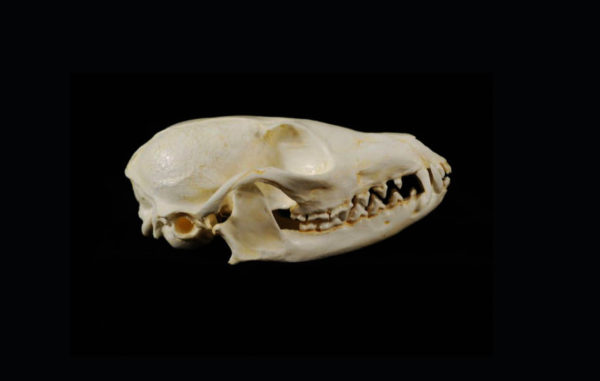All items sold on this website are polyurethane resin replicas, made in USA. No real or natural bone is available on this site.
African Cape Fox Skull
$96.00
The African Cape fox is native to the arid savannas and semi-desert scrub of sub-Saharan Africa. This nocturnal species is primarily solitary but sometimes den communally. The cape fox will store food to eat later. Their diet consists of small vertebrates, insects and carrion.
- Description
- Additional information
Description
African Cape Fox Skull Replica measures 3.9×2.7×2 inches. African Cape Fox Skull is museum quality polyurethane cast. Made in the USA. Cast of original California Academy of Sciences specimen. 2-part skull (separate cranium and jaw). Our precise skull can be used as a teaching tool, museum fox skull exhibit, home décor skull, or office décor skull.
The African Cape Fox other names are Asse Fox, Cama Fox and Silver-Backed Fox.
African Cape Fox or Vulpes chama is a lightly built, slender fox, with bushy tail, medium to large ears and a fine tapered muzzle. Habitat is Open Acacia grasslands, steppe, sub-desert scrub and open grassy areas within bush land.
African Cape fox or Vulpes chama is nocturnal and most active just before dawn or after dusk; it can be spotted during the early mornings and early evenings.
During the day, it typically shelters in burrows underground, holes, hollows, or dense thickets. It is an active digger that will excavate its own burrow, although it generally modifies an abandoned burrow of another species.
African Cape fox or Vulpes chama are solitary creatures, and although they form mated pairs, the males and females are often found alone, as they tend to forage separately.
Cape fox or Vulpes chama are not especially territorial but will mark their territories with a pungent scent.
Although a normally silent fox, the African Cape fox is known to communicate with soft calls, whines or chirps. However, it will utter a loud bark when alarmed.
When in an aggressive mood, the African Cape fox or Vulpes chama is known to growl and spit at its attacker. To show its excitement, the fox lifts its tail, the height of the tail often indicating the measure of excitement.
African Cape fox or Vulpes chama are omnivorous and will eat plants or animals. Although they prefer invertebrates and small mammals such as rodents, they are opportunists and known to hunt and eat reptiles, rabbits, spiders, birds, and young hares.
African Cape fox or Vulpes chama will also eat eggs, beetle larvae, and carrion, as well as most insects or fruits.
African Cape Fox Facts:
Kingdom: Animalia
Phylum: Chordata
Class: Mammalia
Order: Carnivora
Family: Canidae
Genus: Vulpes
Species: V. chama
Binomial name: Vulpes chama
Conservation status: Least concern
Shop More Museum Quality Fox Skulls in Fox Skull Store
Additional information
| Weight | 1 lbs |
|---|---|
| Dimensions | 3.9 × 2.7 × 2 in |
| National Fox Day - September 17th | National Fox Day is celebrated on September 17th by animal lovers and conservationists around the world. The day is a chance to appreciate foxes' role in the environment, correct misconceptions about them, and advocate for their conservation. Foxes are often misunderstood and persecuted, despite their charm, and face threats to their survival from human activities like habitat destruction and hunting. |


